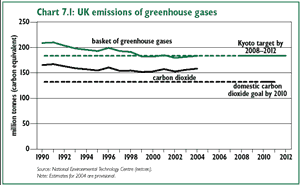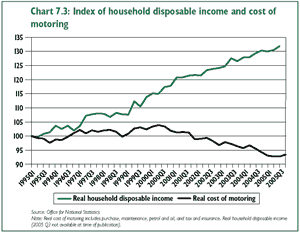Nero fiddled while Rome burnt, but Gordon Brown is doing a different kind of fiddling while the earth warms - with his figures.
Yesterday's Pre-Budget Report confirmed the snail's pace at which this government is determined to take its self-avowed leadership role on climate change.
So he went, as the Low Carbon Kid hoped, for a windfall tax on those record oil company profits, scooping an extra £2.3bn a year for the government coffers.
But will he spend this on energy efficiency? What, spend money to save money? In your dreams.
Instead, he's plugging his own public spending holes, giving another £580 million for the war in Iraq ("the special reserve in 2005-06") and "the UK’s other international obligations", and an extra £85 million for the "war on terror" - or as Brown put it, "to advance the ongoing expansion of the security and intelligence agencies, and extending the availability of the £50 million Counter-Terrorism Pool beyond 2005-06". It's about oil, stupid.

He is also reducing the tax on oil used to generate electricity from 1 January 2006. This is due to EU pressure, as the Climate Change Levy means it is currently being taxed twice.
Duty is also charged at a reduced rate on oils where they are put to certain uses. These exemptions are due to expire at the end of 2006.
But the Chancellor said he wants to apply for an extension of the derogations for fuel used in - wait for it - private air and pleasure craft navigation.
These are used by rich people only, and for fun - the Low Carbon Kid demands to know what on earth is the case for not hitting these sqaundering rich bastards with quadruple tax increases to stop them heating the planet for fun!
The other exemptions to be applied for make more sense: liquified petroleum gas (LPG) and natural gas (NG) used as motor fuel, and waste oils reused as fuel.

Finally, the Government published its draft Code for Sustainable Homes for consultation, available at www.odpm.gov.uk.
The code is based extensively on the excellent EcoHomes system developed by the Building Research Establishment (BRE). But WWF has already heavily criticised other aspects of the Code, and so has the Construction Products Association, complaining that with its reliance on the planning system it could actually result in fewer homes being built.
So here is the schedule for future action.
Action: Date
Energy Efficiency Innovation Review (EEIR) evidence published: December
UK Energy Research Partnership (UKERP) launched: January
Seminar with business on developing energy services markets: January
Revised Climate Change Programme : January/February
Dialogue opened with business on improving energy efficiency investment: January/February
Air Quality Strategy consultation: ?
Government response to the Biomass Taskforce: April
DTI microgeneration strategy: April
Result of Energy Review (inc. response to EEIR): Summer
Stern Review on economics of climate change: Autumn
Comprehensive Spending Review (inc. response to EEIR): 2007
Renewable Transport Fuel Obligation (RTFO).: April 2008.
All of this is just policymaking.
So can any one tell me why the Stern Review on economics of climate change, which you would have thought should have been made available urgently, won't publish its conclusions until after the Energy Review, for which you'd have thought it would be providing the figures?
It's a bit like investing in new plant, without finding out first if it's worth it.
Technorati Tags: Energy; Oil; Environment; ClimateChange; nuclear;
2 comments:
So, Brown's brother works in the French nuclear establishment, so there lies labour's future policy!!!
Question - How much energy is used in street & motorway lighting per year?
solution - solar panel &/or mini wind turbine on each lamp-post charging a battery in the lamp-post.
In the DTI's energy statistics, street lighting, which is administered by local authorities, is lumped under 'public administration', which accounted for 21GWh, or 5%, of total electricity consumption, in 2004.
Can you tell me who Gordon's brother John Brown works for?
Solar and wind powered street lighting is a great idea but not necessarily on each lamp-post. The Woking model, and one pioneered by Wales' own SolarGen, is often cheaper, where a local private wire network is installed.
Post a Comment